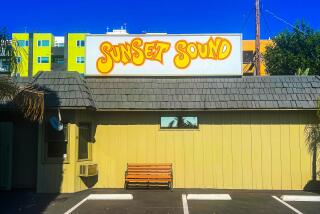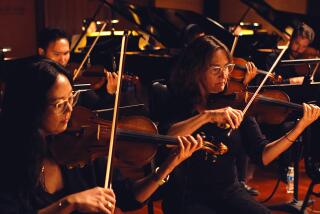Rhapsody on Sunset
- Share via
I have this disease,’ confesses Bob Auletta, hemmed in by an array of majestic Steinway, Mason & Hamlin and Seiler grand pianos. “It’s called, ‘Buy a piano even if you don’t need it.’ ‘
At one point, Auletta had seven grands in his living room and three more in the garage. Instead of starting a self-help group, he opened Strings, Etc., a piano shop specializing in the restoration of American grands from the teens and ‘20s. Auletta was operating out of a location at Sunset Boulevard and Gardner Street when, in 1994, he noticed a magnificent, ivy-covered two-story brick building a few blocks west at Stanley Street that seemed teleported from Boston’s Back Bay. The ground floor was for rent.
“If you’re going to have this piano,’ says Auletta, pointing at a 1902 rosewood Kranich and Bach in a Louis XV case, “it belongs in this building.’
Erected just after World War I, the structure serves as the perfect haven for Auletta’s collection of pianos, several of which predate their surroundings (such as the 1872 Weber that sits in the lobby). It’s a church-like world of high ceilings, earth-toned tile floors and arched entryways sandwiched between the thundering rock clubs of the Sunset Strip to the west and the ghetto of guitar stores a few blocks east.
In the main showroom are a pair of immaculate 1926 grands: a Steinway and a Sohmer (Auletta employs a staff of four to do the restoring). The instruments hail from the era when the United States hand-built the world’s finest, and the living room of nearly every American home had a piano as its centerpiece.
“This is what I love,’ Auletta says, gesturing at the Sohmer, whose six-foot cherrywood case rests on ornately carved legs.
Auletta’s father, Ted Auletta, was a well-known pianist and conductor on Broadway and in New York’s nightclub scene in the ‘60s and ‘70s, and his son followed in his footsteps, studying piano and conducting at Juilliard and CalArts. Though Auletta is involved in multiple endeavors--he runs a thriving music instruction business and is writing a musical about the life of department store magnate R.H. Macy--rebuilding vintage pianos remains his leitmotif. And while he carries everything from modest Yamaha spinets to digitally rigged keyboards, it is the older instruments that make his heart race like Glenn Gould playing a Bach invention.
Lamenting the toll that radio, then TV and later electronic keyboards have taken on piano ownership over the decades, Auletta observes, “Nobody in their right mind goes into the piano business to make money.’ Nevertheless, he has recently noticed a revival of interest, particularly for older instruments. It’s a reassuring sign that, in an age when a portable synthesizer built from plastic and metal can pass for a piano, Auletta is not alone in his reverence for the real thing.
“There are,’ he declares, “people who appreciate what we do.’
More to Read
The biggest entertainment stories
Get our big stories about Hollywood, film, television, music, arts, culture and more right in your inbox as soon as they publish.
You may occasionally receive promotional content from the Los Angeles Times.










